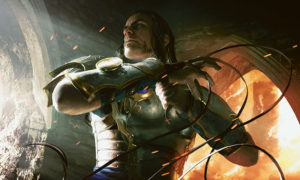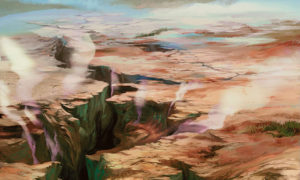After exploring the backstories of the planeswalkers, this week’s Uncharted Realms brings us back to the present to see the white-aligned planeswalker Gideon Jura at war, fighting across two distant fronts. On Zendikar, Gideon wages a desperate rearguard action to save the citadel of Sea’s Gate, where the arcane researchers of that plane work to unravel the secrets of the monstrous Eldrazi. At the same time, Gideon works with the Boros guild of Ravnica to capture the mob boss Krenko, sparking retaliation from the Shattergang Brothers and their gang who wish to carry out their own vengeance. Pushed to his limits by brutal war across two worlds, Gideon finally turns to Jace, the Living Guildpact, for help.
Gideon, from his origins to his present predicament, is a warrior first and foremost. It seems inevitable that we would find him at the frontline of war, even at conflicts worlds apart. In the events of this week’s story, we can see a little of fantasy warfare through the multiverse and discuss how it compares to medieval war in our own history.
Medieval War
If Gideon’s magic and monstrous foes are alien to our history, his suffering is not. “Hunger was great beyond measure,” records the Gesta Francorum, a chronicle of the first Crusade (1096-1099 CE), during the march to Antioch. The anonymous author, a rustic footsoldier under the command of Norman nobleman Bohemund I, would largely have understood Gideon’s exhaustion at the extremity of war.1 “Many of our men died because they did not have the means to buy food. The Turks pressed on all sides, so that none of us dared to leave – they constrained us on one side, and excruciating hunger on the other.”2
A great deal of medieval war depended upon endurance of the seemingly unendurable. The progress of the First Crusade is a prime example. Inspired to belligerent and unprovoked action by the address of Pope Urban II at Claremont in 1095, a vast, disorganized host of the Christian faithful was moved to march upon Jerusalem, intent – for various purposes – to free it from non-Christian control.3 The main thrust of the campaign took the Crusaders through Constantinople and across Asia Minor (modern Turkey) on foot. Far from their French and German homes, without firm allies or established supplies, marching across harsh terrain and hemmed in on all sides by the understandably hostile forces of the Seljuk Sultanate of Rum, the Crusaders were nearly undone by camp diseases and starvation before reaching the walls of Jerusalem.
For Gideon’s various allies and the Crusaders before Antioch, the logistics and planning of a campaign determined its success. Lack of food and supplies killed more Crusaders in the push to Antioch and Jerusalem than the Seljuk forces they faced. The Gesta and other chronicles record that soldiers reduced to desperation boiled leaves in water for nourishment. The mounted men-at-arms ate their horses; the poor ate rats and boots. Injuries left untreated slew countless soldiers. Gideon, without sleep, marching forward on a broken leg, could surely sympathize.
After enduring the march across Asia Minor, the Crusaders successfully seized Antioch, resupplying behind its captured walls. Their successes, however, proved temporary. A massive army under the emir of Mosul arrived and lay siege to the city, trapping the starved and dispirited Crusaders without any chance of relief. A delegation of the Crusade’s noble leaders attempted to negotiate terms, only to be rebuffed. All hope was lost.
Miracles and Morale
It is at this point that the author of the Gesta believed a miracle occurred. “As our leaders, sad and disconsolate, were standing back before the fortress, a certain priest came to them,” records the soldier.5 This priest recounted a vision from Heaven, commanding him and the Crusaders to take heart, for their Lord would protect them in their time of need. Sure enough, the leader of the peasantry in the Crusade, one Peter the Hermit, led the noble commanders of the army to a certain spot in the city which was preordained by the Apostle Andrew, where he withdrew a lance claimed to be the weapon that pierced the side of Christ upon the cross.
“Fighting to avoid something,” Gideon reflects as he watches the Eldrazi overcome the Sea Gate, “was not the same as fighting for something.”
Starved, wounded, isolated and besieged, the Crusaders nevertheless took hope. Rather than wait out the better supplied besiegers, Bohemund and the other commanders sallied forth. This audacious tactic proved successful. After a long struggle at the Turkish camp, the seaward flank of their army collapsed, and the Crusaders overcame their besiegers and routed the Mosul army. “The people of Christ, the victorious pilgrims,” reports the exultant Gesta, “returned to the city, rejoicing in the happy triumph over their defeated foes.”
More than armaments and tactics like Kytheon’s phalanx, even more than supplies, food, and sleep, the armies of the medieval period fought and won on morale. Gideon’s story makes clear the brutal cost of war on medieval combatants – injuries that would not heal, campaigns that would not end, and rest that would not come. No amount of tactical preparation could forestall the painful realities of campaign hardship in an era where people struggled to feed themselves even in peacetime. To carry on the fight in the face of these unendurable challenges, morale was vital.

Gideon’s story this week makes the point clear. “Fighting to avoid something,” he reflects as he watches the Eldrazi overcome the Sea Gate, “was not the same as fighting for something.” Like the Crusaders behind the walls of Antioch, it is this idea that animates Gideon, as neither force could prevail simply waiting for its doom. With this thought in mind, he rescues what remains of the research team working on the “mystery of the leylines,” and ‘walks to Ravnica again, hoping to consult the greatest expert he knows. Whether Jace’s help is as miraculous as the discovery of the Holy Lance in Antioch remains to be seen, but for the moment, the hope for his aid – for a miracle to turn back the Eldrazi – is what keeps Gideon going. On Earth, Zendikar, and Ravnica, it was hope for a miracle that kept armies of the medieval era on the march in the face of insurmountable odds.
1 Poor guy, the morality of the Crusaders’ cause notwithstanding. Every medieval chronicler after him cites him as a bumptious yokel and claims to improve upon his work. Long after, the Gesta remains a vital chronicle for its plain record of events in the First Crusade.
2 Gesta Francorum in Edward Peters, The First Crusade (Philadelphia: The University of Pennsylvania Press, 1971)
3 Which they ultimately achieved by massacring the population of Jerusalem in 1099, an act that shocked the non-Christian world.
5 Ibid.


